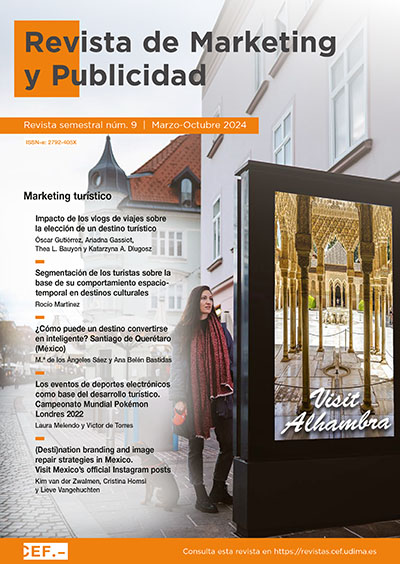E-sports events as a basis for tourism development. Case study of the Pokémon World Championship London 2022
DOI:
https://doi.org/10.51302/marketing.2024.19429Keywords:
tourism, marketing, events, territory enhancer, electronic sports, Pokémon, LondonAbstract
This paper studies the potential of esports events as a tourism promotion tool. It seeks to understand how this type of event can influence the territory and the city where they are held. To this end, a specific study is carried out on the Pokémon World Championship London 2022. The work is based on surveys carried out among those attending the event in order to try, with their answers, to answer the initial question posed. With this research, the motivations of the attendees and the degree of influence the event has had on their choice of destination are ascertained. In this way, the objectives set out are achieved. With the results of this work, it is possible to show cities and decision-makers that holding this type of event is, in any case, positive and beneficial for the economic, social and cultural development of the city. The aim is to increase support for this type of event and to improve the stability of the industry, which is in full expansion and development.
Downloads
References
AEVI. (2021). Los esports en España: situación actual y posición de la industria. http://www.aevi.org.es/web/wp-content/uploads/2020/12/Informe_esports_ESP_20.pdf
Antón, M. (2018). Los eventos de deportes electrónicos (esports) como herramienta de promoción turística. En XII Congreso Virtual Internacional Turismo y Desarrollo (pp. 77- 89).
Chikish, Y. C., Carreras, M. C. y García, J. G. (2019). eSports: A new era for the sports industry and a new impulse to research in sports (and) economics? https://www.funcas.es/wp-content/uploads/Migracion/Publicaciones/PDF/2163.pdf#page=488
Díaz, A. (2008). El turismo de los eventos deportivos. En Investigaciones turísticas. Una perspectiva multidisciplinar. I Jornadas de Investigación en Turismo, Sevilla, 7 y 8 de mayo de 2008 (pp. 1-14). Edición Digital@Tres.
Funk, D. C., Pizzo, A. D. y Bradley, J. B. (2018). eSport management: Embracing eSport education and research opportunities. Sport Management Review, 21(1), 7-13.
Hall, C. M. (1992). Adventure, sport and helth, En C. M. Hall y B. Weiler (Eds.), Special Interest Tourism. Pluto Press.
Hamari, J. y Sjöblom, M. (2017). What is eSports and why do people watch it? Internet Research, 27(2), 211-232.
Moreno, J. R. (2016). La motivación del turismo deportivo en espacios naturales [Tesis doctoral, Universidad Miguel Hernández].
Newport, A. (12 de noviembre de 2019). eSports and the quest for personalisation: Is the travel industry missing a trick? Travel Daily. https://www.traveldailymedia.com/esports-and-the-quest-for-personalisation-is-the-travel-industry-missing-a-trick/
Standeven, J. y Knop, P. (1999). Sport tourism. Human Kinetics.
The Pokémon Company International. (2023). Play! Pokémon Events. https://www.pokemon.com/uk/play-pokemon
Vegara Ferri, J. M., Ibáñez Ortega, D., Carboneros, M., López-Gullón, J. M. y Angosto, S. (2020). Evaluation of the tourist perception of the spectator in an eSport event. Publicaciones, 50(1), 371-384.
VisitRaleigh. (9 de octubre de 2019). Raleigh’s Largest Esports Event Generates $1.45 Million in Economic Impact and Drives Employment. https://www.visitraleigh.com/media/press-release/post/raleighs-largest-esports-event-generates-145-million-in-economic-impact-and-drives-employment/
Weed, M. E. y Bull, C. J. (1999). Integrating sport and tourism: a review of regional policies in England. Progress in Tourism and Hospitality Research, 2(2), 129-147.
Downloads
Published
How to Cite
Issue
Section
License
Copyright (c) 2024 Laura Melendo Rodríguez-Carmona, Víctor de Torres Palacios

This work is licensed under a Creative Commons Attribution-NonCommercial-NoDerivatives 4.0 International License.





















